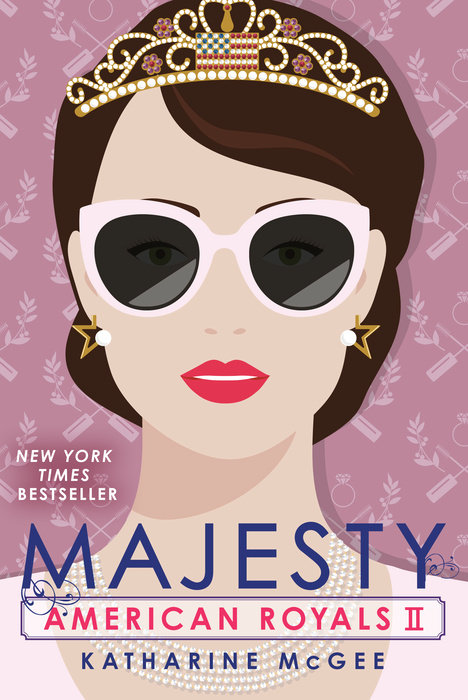American Royals II: Majesty
American Royals II: Majesty is a part of the American Royals collection.
America has its first ever queen on the throne in this sequel to American Royals! If you can't get enough of Harry and Meghan and Will and Kate, you'll love this New York Times bestseller that imagines America's own royal family--and all the drama and heartbreak that entails. Crazy Rich Asians meets The Crown. Perfect for fans of Red, White, and Royal Blue and The Royal We.
Power is intoxicating. Like first love, it can leave you breathless. Princess Beatrice was born with it. Princess Samantha was born with less. Some, like Nina Gonzalez, are pulled into it. And a few will claw their way in. Ahem, we're looking at you Daphne Deighton.
As America adjusts to the idea of a queen on the throne, Beatrice grapples with everything she lost when she gained the ultimate crown. Samantha is busy living up to her "party princess" persona...and maybe adding a party prince by her side. Nina is trying to avoid the palace--and Prince Jefferson--at all costs. And a dangerous secret threatens to undo all of Daphne's carefully laid "marry Prince Jefferson" plans.
A new reign has begun....
An Excerpt fromAmerican Royals II: Majesty
1
Beatrice
Six weeks later
Beatrice had never heard the palace so silent.
Normally its halls echoed with noise: butlers giving orders to footmen; tour guides lecturing groups of students; ambassadors or ministers chasing after the Lord Chamberlain, begging for an audience with the king.
Today everything was still. Dust sheets hung over the furniture, emitting a ghostly glow in the half-light. Even the crowds that usually thronged the main gates had melted away, leaving the palace stranded, an island in a sea of empty sidewalks and trampled grass.
Behind her, Beatrice heard her mom getting out of the car. Sam and Jeff had elected to stay at the country house another night. When they were younger, the three siblings used to go there together—in a dark SUV, watching movies on its drop-down TV—but Beatrice could no longer ride in the same car as her sister. The monarch and the first in line for the throne weren’t permitted to travel together, for security reasons.
She’d only made it halfway across the entrance hall when her heel snagged on an antique carpet. She stumbled—and a firm hand reached out to steady her.
Beatrice looked up into the cool gray eyes of her Revere Guard, Connor Markham.
“You okay, Bee?”
She knew she should reprimand him for using her nickname instead of her title, especially in public, where anyone might overhear. But Beatrice couldn’t think properly with Connor’s hand on hers. After all these weeks of distance, the feel of his touch sparked wildly through her veins.
Voices echoed down the hallway. Connor frowned but took a swift step back, just as two footmen turned the corner, accompanied by a man with grim features and salt-and-pepper hair: Robert Standish, who’d worked as Lord Chamberlain for Beatrice’s father, and now for her.
He swept a formal bow. “I’m sorry, Your Majesty. We weren’t expecting you until tomorrow.”
Beatrice tried not to flinch at the title. She still wasn’t used to Your Majesty being directed at her.
The footmen began moving from room to room, whipping away dust sheets and tossing them in a pile. The palace sprang to life as ornate side tables and delicate brass lamps were hurriedly uncovered.
“I decided to come back early. I just . . .” Beatrice trailed off before saying I just needed to get away. This past month at Sulgrave, the Washingtons’ country estate, was supposed to have been a getaway. But even surrounded by family, she’d felt alone. And exhausted.
Each night Beatrice tried to stay awake as long as she could, because once she fell asleep the dreams would come. Horrible, twisted dreams where she had to watch her father die, over and over again, and know that it was her fault.
She had caused her dad’s death. If she hadn’t shouted at him that night—hadn’t threatened to marry her Revere Guard and renounce her position as queen—then King George might still be alive.
Beatrice bit back a sigh. She knew better than to let herself think like this. If she did, her mind would sink like a stone, deeper and deeper into a well of grief without ever touching bottom.
“Your Majesty.” Robert glanced down at the tablet he carried with him at all times. “There are a few things I’d like to discuss. Should we head up to your office?”
It took a moment for Beatrice to realize that he meant her father’s office. Which belonged to her now.
“No,” she replied, a little forcefully. She wasn’t ready to face that room—and all the memories trapped inside it. “Why don’t we talk in here?” she added, gesturing to one of the sitting rooms.
“Very well.” Robert followed her inside and pulled the double doors shut behind them, leaving Connor in the hall.
As she perched on a striped green sofa, Beatrice darted a glance at the three bay windows that overlooked the front drive. It was a nervous habit she’d picked up after her father’s death: to study the windows of each room she walked into. As if the natural lighting might help her feel slightly less suffocated.
Or as if she was looking for an escape route.
“Your Majesty, your schedule for the upcoming week.” Robert held out a sheet of paper, embossed with the royal crest.
“Thank you, Lord Standish,” Beatrice said, and paused. She’d always addressed him by his full title, ever since she’d met him as a teenager, but now . . . “May I call you Robert?”
“I would be honored,” he said obsequiously.
“In that case, you must start calling me Beatrice.”
The chamberlain gave a throaty gasp. “Oh, no, Your Majesty. I would never presume to do such a thing. And I would suggest,” he added, “that you never make an offer like that again, certainly not to anyone in a service position. It simply isn’t appropriate.”
Beatrice hated that she felt like a chastened schoolgirl, like she was seven years old again and her etiquette master had snapped a ruler over her knuckles as punishment for a sloppy curtsy. She forced herself to study the paper in her lap, only to look up in confusion.
“Where’s the rest of my schedule?”
The only events listed were low-stress public appearances—a nature walk outside the capital with a conservation group, a meet-and-greet with the local Girl Scouts—the sort of goodwill-generating events that Beatrice used to do as heir to the throne. “I should have an audience with each of the party leaders in Congress,” she went on. “And why isn’t a Cabinet meeting scheduled for Thursday?”
“There’s no need to dive into all of that right away,” Robert said silkily. “You’ve been out of the public eye since the funeral. Right now, what the people need from you is reassurance.”
Beatrice fought off a sense of disquiet. The monarch was meant to govern, not run around shaking hands like some kind of mascot for America. That was what the heir to the throne was for.
But what could she say? Everything she knew about this role she had learned from her father. Now he was gone, and the only person left to advise her was Robert, his right-hand man.
The chamberlain shook his head. “Besides, I’m sure you’ll want to spend the next few months planning the wedding.”
Beatrice tried to speak, but her throat seemed to have glued itself shut.
She was still engaged to Theodore Eaton, the son of the Duke of Boston. But in the past month, each time she’d started to think of Teddy, her mind had violently shied away. I’ll figure it out when I’m back, she’d promised herself. There’s nothing I can do about it now.
It had been easy to let herself forget about Teddy at Sulgrave. None of her family members had spoken of him. They hadn’t spoken much at all, each of them wrapped up in their own private grief.
“I’d prefer not to focus on the wedding just yet,” she said at last, unable to hide the strain in her voice.
“Your Majesty, if we start planning now, we can hold the ceremony in June,” the chamberlain argued. “Then, after your honeymoon, you can spend the rest of the summer on the newlyweds’ royal tour.”
Might as well say it all at once, Beatrice thought, and braced herself. “We’re not getting married.”
“What do you mean, Your Majesty?” Robert asked, his lips pursed in confusion. “Did something . . . happen between you and His Lordship?” Beatrice drew in a shaky breath, and he lifted his hands in a conciliatory gesture. “Please, forgive me if I’m overstepping. To do my job effectively, I need to know the truth.”
Connor was still standing out there in the hallway. Beatrice could picture him: frozen in the Revere Guard stance, his feet planted firmly, a hand near his holstered weapon. She wondered, with a bolt of panic, if he could hear them through the closed wooden doors.
She opened her mouth, ready to tell Robert about Connor. It shouldn’t be hard; she’d had this very conversation with her father—had marched into his study and informed him that she was in love with her Revere Guard—the night of her engagement party to Teddy. So why couldn’t she say the same thing now?
I need to know the truth, Robert had insisted. Except . . . what was the truth?
Beatrice didn’t know anymore. Her feelings for Connor were tangled up in her feelings about everything else, desire and regret and grief all painfully intertwined.
“I’d agreed to get married while my father was still alive, because he wanted to walk me down the aisle,” she managed. “But now that I’m queen, there’s no need to rush.”
Robert shook his head. “Your Majesty, it’s because you are queen that I suggest you get married as soon as possible. You are the living symbol of America, and its future. And given the current situation . . .”
“The current situation?”
“This is a period of transition and uncertainty. The nation hasn’t recovered from your father’s death as easily as we might have hoped.” There was no inflection, no emotion in Robert’s tone. “The stock market has taken a hit. Congress is at a stalemate. Several of the foreign ambassadors have handed in their resignations. Just a few,” he added, at the expression on her face. “But a wedding would be such a unifying occasion, for everyone in the country.”
Beatrice heard the subtext beneath his words. She was now the Queen of America—and America was afraid.
She was too young, too untried. And most of all, she was a woman. Attempting to govern a country that had only ever been led by men.
If there was instability in America right now, Beatrice was the cause of it.
Before she could respond, the room’s double doors swung open. “Beatrice! There you are.”
Her mom stood in the doorway. She looked elegant even in her travel clothes—slim-cut navy pants and a pale blue sweater—though they fit more loosely than they used to. Grief hung over her shoulders like a weighted cloak.
When Queen Adelaide saw Robert, she hesitated. “Sorry, I didn’t mean to interrupt.”
The chamberlain rose to his feet. “Your Majesty, please join us. We were just discussing the wedding.”
Adelaide turned to Beatrice, a new warmth in her voice. “Have you and Teddy set a date?”
“Actually . . . I’m not sure I’m ready to get married.” Beatrice shot her mom a pleading glance. “It feels too fast. Don’t you think we should wait until we’ve had time to grieve?”
“Oh, Beatrice.” Her mom sank onto the couch with a heavy sigh. “We’ll never be done grieving. You know that,” she said softly. “It might sting less with time, but that doesn’t mean we’ll ever stop feeling the loss. We’ll just get a little better at carrying it.”
Across the room, Robert nodded in vigorous agreement. Beatrice tried to ignore him.




